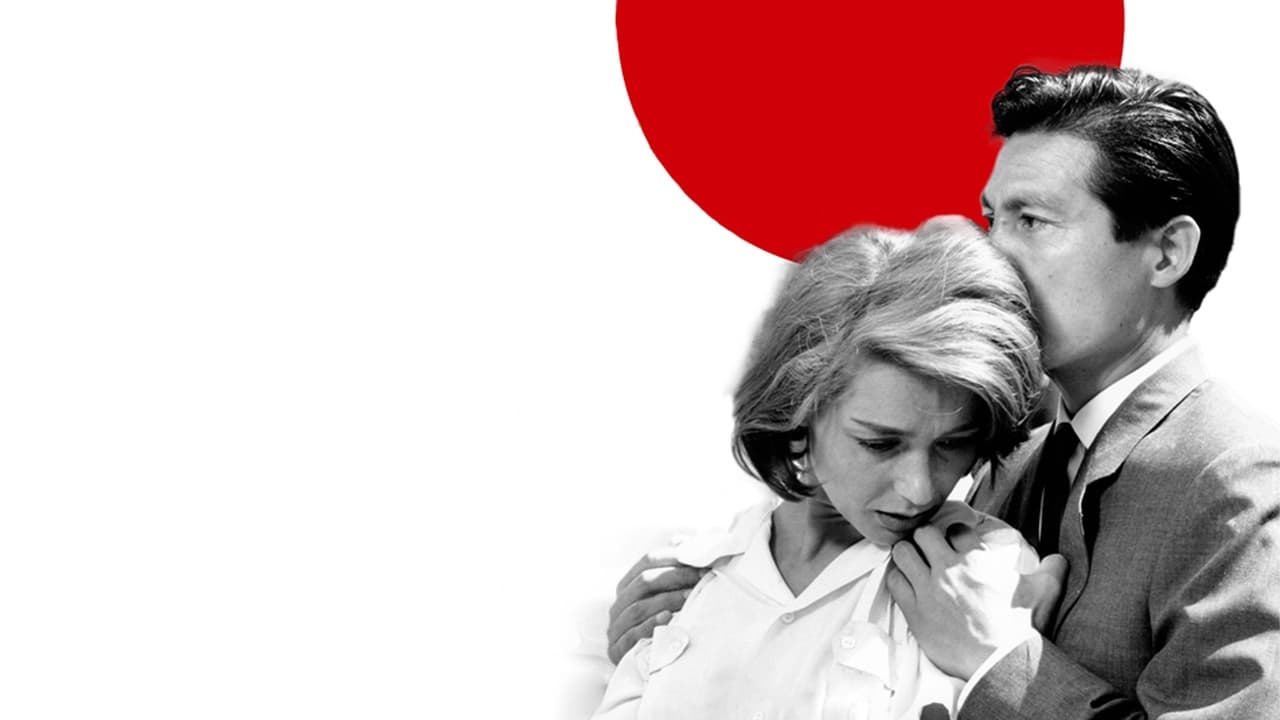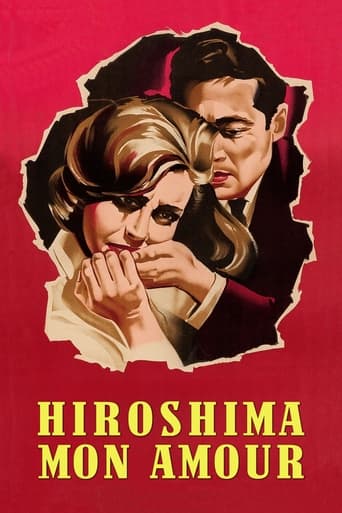

Best movie of this year hands down!
... View MoreWow! Such a good movie.
... View MoreHow sad is this?
... View MoreThe movie really just wants to entertain people.
... View MoreThis movie isn't a movie. It's a poem. When poetry becomes film you get this kind of masterpieces. It's a slow-paced, beautifully shot, heartbreaking love story. It's a touching, human, meaningful film about oblivion. Duras' prose is just unbelievably poetic and Riva's performance as an independent –yet so attached to her lost lover– woman brings the film to a new level of groundbreaking way of storytelling. The dialogues between her and Okada are about things we've all thought and felt every now and then. It takes place in Hiroshima fifteen years after the bomb and I find it brilliant how the movie talks about the global tragedy that was the dropping of an atomic bomb and the personal tragedy that is to lose and try not to forget the man you loved. As it is the script what struck me the most, I personally don't think this is as much as a Resnais' film as it is Duras'. Almost 60 years already. Everyone with a major role in the movie is gone. But they are not dead. They just became "Hiroshima Mon Amour". Might we not forget them.
... View MoreHiroshima MON AMOUR is a romantic drama about lost love, war, wishes and concerns. A French actress has came to Hiroshima to shoot a film about peace. She begins an affair with an architect. One passionate night has revived their war trauma from the past... The protagonists, which are lost in their strong emotions, are nameless. Confusing repetition of words and desires have connected two souls. They are investigating wartime past and her first love. The pace is rather slow. Unclear story was interrupted by sudden flashbacks. Scenery is a sort of contrast between the destroyed and reconstructed city. Death, disease, suffering and pain were replaced by love and memories. A love, that has trapped in the past, has escaped to the surface. A short and intense romance was compared with a strong wartime love. The protagonists were torn with an internal conflict between loyalty and indecision. Emmanuelle Riva as Elle (She)is a pale, gentle and concerned woman. Her world has collapsed in her war youth. She attempts, through a brief romance, to revive her severe war past. Eiji Okada as Lui (He)is confused lover, who has tried to understand the new situation. He is a man who feels love around him while it slowly escapes from him.Stay? Leave? Try? Lots of questions. There is no answer. However, Mr. Resnais has, trough a common contrasts, flashbacks and non-linear narrative structure, made a very good movie.
... View MoreHonestly, I really really really want to like this film. It's a historical story, about two people from different backgrounds, in a city I'd love to visit. Even the title itself is so inviting and I was really excited to watch it. My exact reaction after the movie ended was: "What? Did anyone understand what was going on?" I watched it for a Film studies class, so was asking my fellow classmates, who seemed to be just as confused as I was.The acting from the start is a little awkward and static. I don't feel the connection between the two who are supposed to be in a romantic relationship and it seems like Elle has a little bit of a mental problem. She would suddenly just burst out at times. Maybe I'm just not romantic enough to like this but I was seriously in a little pain while watching this.I read an article by Jennifer Barker, in which she talks of phenomenology and the way that touch is used in this film to help Elle remember her traumatic past which in turn helps her to connect more to the incident of Hiroshima. Reading that, it all makes sense, but I would still rather read it than watch the movie. The article, probably because it was explaining the movie was so much clearer. I guess in a way I can see what the movie is doing, and maybe I just don't have the eye for detail but it went by too slowly for me.However the cinematography was pretty great, there was some great panning and tracking shots which helped to set the mood. Also, the juxtaposition with scenes of the past and the present was pretty well done, and was not confusing at all. Though the script does make it confusing in the present when Elle suddenly refers to Lui as her former lover.Read more movie reviews at: championangels.wordpress.com
... View MoreAs a college freshman some 45 years ago, I saw this film in the student union They had a commitment to art films. I have to say that I do remember the stream of dialog between the two characters but little about the content. I knew he (the Japanese man) had lost his family on that August day. I recall her pulling inward as he becomes a bit demanding. Watching it with mature eyes and a fresh view of the world, I was brought back to these two traumatized characters and the war that changed them forever. It begins with a discussion of the Hiroshima museum which contains pictures and artifacts from that fateful day. He keeps telling her that she has not seen Hiroshima as they lay entwined in bed. His pain is more predictable. He lost his family that day while he was away. Hers takes a more melancholy road. As she opens up, she tells the story of a love affair with a German soldier whom she would meet in all manner of places. One day she found him dying, curled up on the ground. She sits with him until he dies. New of their trysts gets out and she is ostracized by her community, her hair cropped, beaten, and thrown in a cellar by her own family. She has not told this story to anyone, including her own husband, until now. While she feels somewhat liberated the pain is too deep. The Japanese man, also married, wants her to stay in Hiroshima. The movie is about the relationship going forward with such damaged people. She repeatedly tries to escape him, but he keeps resurfacing. The sad thing is that she desires him and so it's not as if she is being stalked. Resnais is a master with the camera, using black and white contrasting images, engaging flashbacks, close-ups. One really marvelous scene is where the young woman, who has been playing a small part in an anti-war film, is nearly trampled by protesters carrying signs. Hiroshima is constantly in her face. She has been hurt so badly by the war and is carrying a load of guilt. War carries with it a loss of innocence and pain beyond the obvious. This film really captures this.
... View More